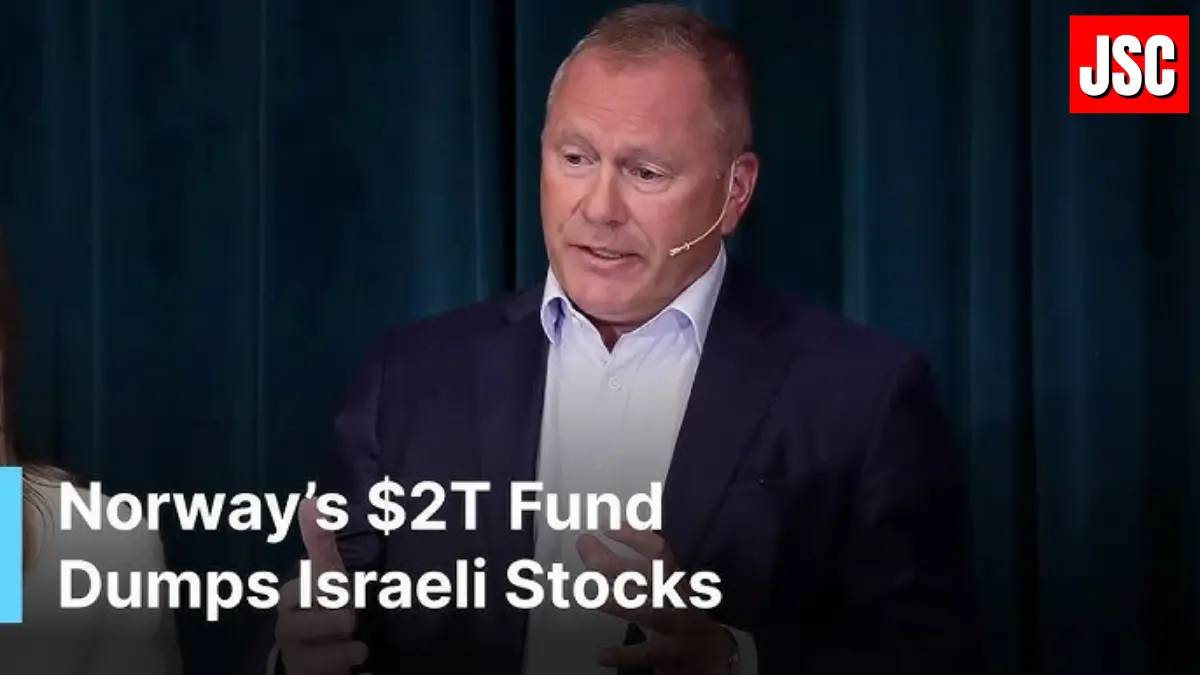Norway’s $2 trillion sovereign wealth fund, the world’s largest, is set to sell more Israeli stocks over the Gaza and West Bank situation after recent divestments from 11 companies, including Bet Shemesh Engines.
Table of Contents
Norway’s $2 Trillion Wealth Fund to Sell More Israeli Stocks Amid Gaza and West Bank Crisis
OSLO / TEL AVIV — In a move sending ripples across global markets, Norway’s $2 trillion sovereign wealth fund, the largest in the world, has announced plans to divest further from Israeli companies due to the worsening humanitarian situation in Gaza and the West Bank.
The decision, confirmed Tuesday by Norges Bank Investment Management (NBIM), underscores how geopolitical tensions are influencing major investment strategies — even for funds traditionally focused on long-term, globally diversified returns.
🚨 Why This Matters: A Shift in the World’s Largest Portfolio
NBIM isn’t just any institutional investor — it owns an average of 1.5% of all listed companies worldwide, across 70+ countries. When the fund moves, markets take notice.
The announcement comes just one day after NBIM confirmed it had terminated contracts with external asset managers handling certain Israeli investments and sold its stake in Bet Shemesh Engines Ltd (BSEL) — a jet engine group that provides maintenance services for Israel’s fighter aircraft fleet.
“We expect to divest from more companies,” NBIM CEO Nicolai Tangen told reporters, signaling that the divestment is part of a broader, ongoing review of the fund’s holdings in Israel.

The Gaza & West Bank Context
The divestment move is closely linked to escalating humanitarian concerns in Gaza and the West Bank, where ongoing conflict has drawn international criticism and raised questions over corporate links to military activity.
Since the outbreak of war in Gaza in late 2023, global investors have faced increasing pressure from advocacy groups, NGOs, and certain governments to scrutinize investments linked to the conflict.
NBIM’s ethical guidelines — designed to reflect Norway’s foreign policy stance and human rights commitments — provide a framework for excluding companies whose operations are deemed to contribute to human rights violations or severe environmental damage.
Bet Shemesh Engines: A Short-Lived Investment
NBIM began investing in Bet Shemesh Engines in November 2023, just weeks after the war began. According to Tangen, this was done through an external investment manager.
Over the following months, the company was rated as “medium-risk” from an ethics perspective — a designation that later shifted to “high-risk” in May 2024 due to increased scrutiny over its military contracts.
“That change should have happened sooner,” Tangen admitted. “We should have been quicker in taking back control of the Israeli investments.”
Bet Shemesh has not responded to media requests for comment on the divestment.
11 Israeli Companies Already Out — More to Follow
As of June 30, NBIM held stakes in 61 Israeli companies. That number has already dropped, with divestments from 11 firms in recent days — BSEL included.
The fund has not publicly named the other companies it has exited, but industry analysts suggest the list may include defense contractors, infrastructure providers, and certain technology firms with military-linked contracts.
Market watchers expect further selling pressure on Israeli equities if NBIM continues its withdrawals.
Ethical Investing Meets Geopolitics

NBIM has a long track record of aligning investments with ethical guidelines. In past years, the fund has exited stakes in companies over issues ranging from coal production and tobacco manufacturing to labor rights violations.
Its Ethics Council, an independent advisory body, plays a key role in screening companies. Recommendations often lead to exclusions or active engagement with management to push for changes.
The Gaza conflict has become the latest test case for how quickly — and decisively — NBIM can act on geopolitical risk factors.
Impact on Israeli Markets
Israeli equities have already faced volatility in 2024, partly due to regional instability and slowing foreign investment inflows. NBIM’s exit from multiple holdings could exacerbate these trends, especially if other large institutional investors follow suit.
Tel Aviv Stock Exchange (TASE) data shows that Israeli defense and aerospace stocks have been among the most resilient sectors since the conflict began, benefiting from rising government spending. However, a divestment wave from ESG-conscious funds could alter that trajectory.
The Bigger Picture: Global Sovereign Wealth Trends
Sovereign wealth funds (SWFs) — especially those with public ethical mandates like NBIM — are increasingly factoring human rights and governance issues into their asset allocation decisions.
Other funds, such as New Zealand’s Super Fund and certain European pension funds, have also restricted or exited investments tied to contentious geopolitical events.
In NBIM’s case, the scale of its portfolio — spanning stocks, bonds, real estate, and renewable projects — means that ethical divestments are as much political signals as they are financial maneuvers.
NBIM’s Market Performance Still Strong
Despite the heightened scrutiny over its Israeli holdings, NBIM continues to post strong financial returns. On Tuesday, it reported a 698 billion Norwegian crowns ($68.28 billion) profit for the first half of 2024, with an overall return of 5.7%, matching its benchmark index.
“The result is driven by good returns in the stock market, particularly in the financial sector,” Tangen noted.
What’s Next for NBIM and Israeli Stocks?
- Short term: Expect continued divestment announcements as NBIM’s review progresses.
- Medium term: Market analysts will watch for copycat moves by other large funds, which could amplify the selling pressure on certain sectors in Israel.
- Long term: NBIM’s handling of this case could redefine how sovereign funds balance returns with ethics in conflict zones.
Frequently Asked Questions (FAQs)
1. What is Norway’s sovereign wealth fund?
Norway’s sovereign wealth fund, officially managed by Norges Bank Investment Management (NBIM), is the world’s largest with assets of about $2 trillion. It invests the country’s oil and gas revenues into global stocks, bonds, real estate, and renewable projects.
2. Why is the Norwegian fund selling Israeli stocks?
The fund is divesting due to ethical concerns related to the ongoing humanitarian crisis in Gaza and the West Bank. NBIM’s ethical guidelines allow it to exclude companies involved in human rights violations or activities that conflict with Norway’s foreign policy principles.
3. Which Israeli companies has the fund divested from?
NBIM confirmed it sold its stake in Bet Shemesh Engines Ltd and divested from 10 other Israeli companies. The full list of companies has not been disclosed.
4. How much Israeli stock does NBIM still hold?
As of June 30, NBIM had stakes in 61 Israeli companies. This number is expected to decrease further as the divestment review continues.
5. Will this decision impact Israeli markets?
Yes. Given the fund’s global influence, selling off Israeli stocks could pressure share prices, especially if other large institutional investors follow suit.
6. How does NBIM decide to exclude companies?
NBIM’s Ethics Council reviews companies based on environmental, social, and governance (ESG) factors. Companies linked to human rights abuses, environmental destruction, or other serious ethical breaches may be excluded.
7. Is NBIM’s portfolio still performing well despite divestments?
Yes. In the first half of 2024, the fund posted a profit of 698 billion Norwegian crowns ($68.28 billion), with a 5.7% return, largely driven by gains in the financial sector.
8. Could this trigger similar actions by other sovereign wealth funds?
Potentially. NBIM’s decisions often influence other funds and ESG-focused investors, making it possible that similar divestments could follow.
-
Norway’s $2 Trillion Wealth Fund Plans More Israeli Stock Sales Amid Gaza and West Bank Crisis

Norway’s $2 trillion sovereign wealth fund, the world’s largest, is set to sell more Israeli stocks over the Gaza and West Bank situation after recent divestments from 11 companies, including Bet Shemesh Engines. Norway’s $2 Trillion Wealth Fund to Sell More Israeli Stocks Amid Gaza and West Bank Crisis OSLO / TEL AVIV — In…